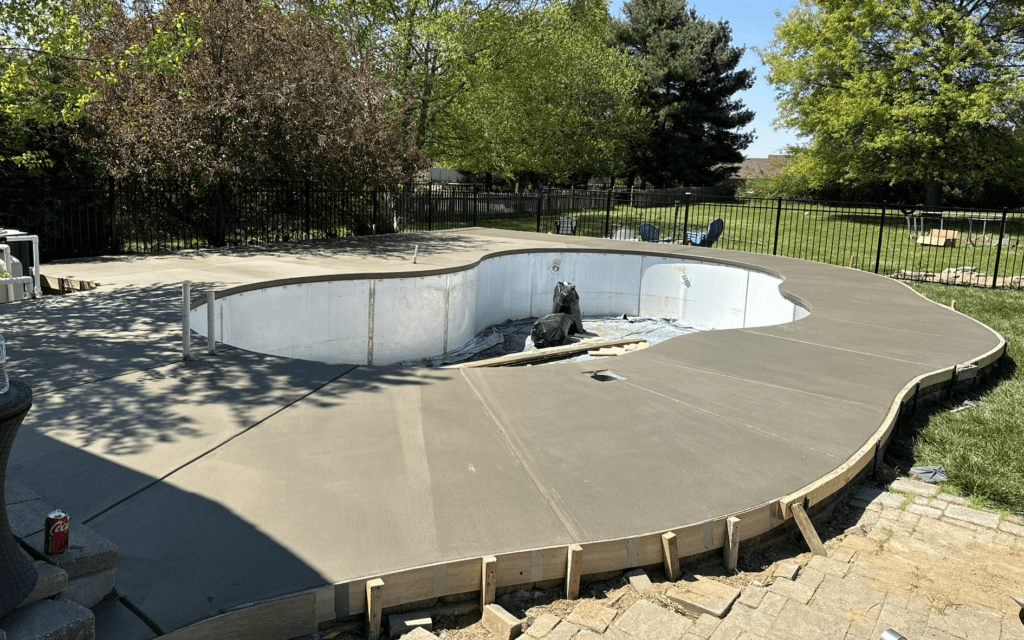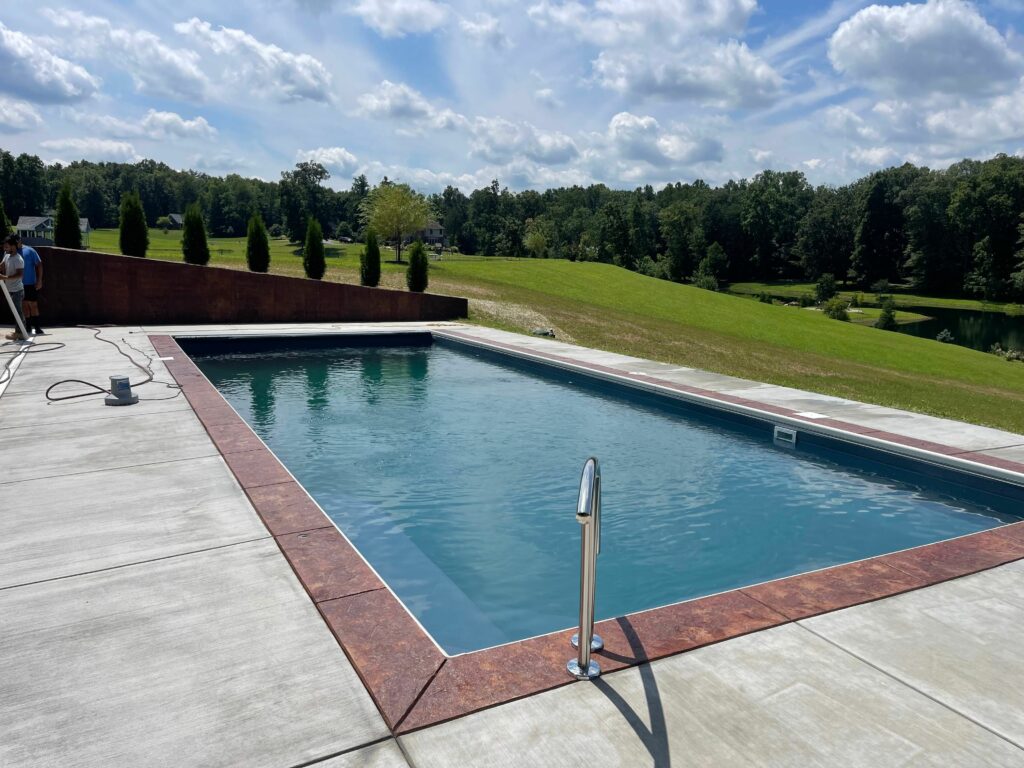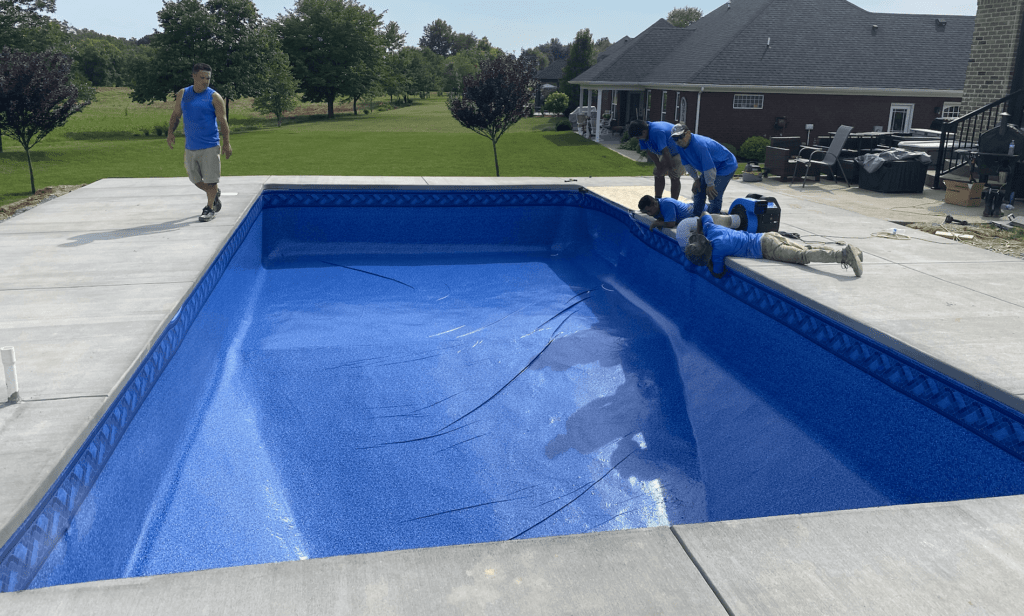Pool installation is not a DIY job. It requires a team of contractors who know what they’re doing, follow the right building codes, and have the right permits.
This is why it’s always recommended you hire professionals like us to do the job for you.
Homeowners in Louisville can forget that it’s not just pool building – there’s a lot of things that go into installing a pool in your backyard. And from all of these – permits alone are one of the hardest.
For the sake of showing how complicated the process can be, and why Louisville homeowners shouldn’t try it by themselves, this article will explain the process.
Our hope in this article is to show you the care that goes into each project.
Step 1 – Preparation and Research:
Before we request permits, we need to know what it is specifically we’re asking for. Commonly needed permits for pool projects include building, electrical, and plumbing permits.
The building permits are to make sure that the pool and any related structures, like decks or enclosures, are built according to the local building codes.
Building permits help local authorities in Louisville ensure that all structures are safe for use and do not negatively impact the surrounding environment or community.
The review process includes checking the design, materials, and overall construction plans against safety standards and regulations.
Pools often require electrical installations for lighting, heating, and powering water pumps. Electrical permits are necessary to ensure that all electrical systems in the pool are installed correctly and safely, following the National Electrical Code and local safety standards.
Plumbing permits make sure that the plumbing work associated with the pool, including water supply and drainage, adheres to Louisville health and safety regulations.
Proper plumbing is essential not only for the operation of the pool but also for maintaining water quality and preventing potential contamination and water wastage.
You can visit the official Louisville government website or the Kentucky Department of Housing, Buildings and Construction page to learn more about what project needs which permit.
You should also be aware of zoning requirements for pools in Louisville. For example, if you live in a more urban area, the laws are generally tighter in the state of Kentucky.
Step 2 – Gathering Documentation:
In Louisville, KY, detailed site plans for pool installation are crucial due to stringent local zoning and building codes that regulate construction within the city or area.
Your plans must outline the proposed pool’s location, dimensions, and other structural details. The importance of this lies in ensuring that all structures conform to safety standards, property lines are respected, and there is no encroachment on easements or infringement on set zoning regulations.
For example, if your pool is planned too close to property boundaries, it might violate setback requirements, leading to legal challenges or the need for costly modifications.
Submitting detailed site plans during the permit application helps identify and rectify such issues early in the planning stage, ensuring compliance and avoiding future disputes.
You should also collect contractor information. Collecting this detailed contractor information, including licenses and proof of insurance, is essential.
This not only helps in verifying the credibility and legitimacy of the contractors but also ensures that the construction work will adhere to professional standards and local regulations.
In Louisville, where the enforcement of building standards is strict to maintain community safety and integrity, having a licensed contractor is a requirement for obtaining necessary permits.
You should know that these requirements serve to protect your investment. By ensuring that all structural plans are reviewed and approved, and that the contractor is fully qualified and insured, homeowners are safeguarded against potential risks such as construction faults, future legal complications, and unexpected financial burdens.
For instance, hiring a contractor without the proper credentials might lead to substandard work that does not comply with the local building codes, potentially resulting in penalties, project delays, or even demolition of non-compliant structures.
Step 3 – Application Process:
Louisville residents can apply for permits online through the Louisville Metro Business Portal. This platform allows for electronic submission of applications, document uploads, and status tracking.
Once you have the right information and know what you need, you can easily request a permit for your project directly on the website.
Step 4 – Review and Inspections:

After submission, your plans will be reviewed by local authorities to ensure they comply with all building and safety codes.
It typically takes within 2 – 8 weeks for permits to be approved or denied. If you’ve studied what you need, it should be easily approved.
If you weren’t approved, you can always file a dispute, although that also can take another 2 months to be resolved.
Inspections are typically required both during and after the installation to ensure ongoing compliance with the approved plans.
This is to make sure that the work is going to plan, contractors are adhering to health and safety standards, and the city is satisfied.
Step 5 – Approval and Completion:

Once the installation is complete and all inspections are passed, you’ll receive final approval from the authorities.
For pools in Louisville that are part of a larger construction project, such as a new home or major renovation, a certificate of occupancy may be issued. This certificate confirms that the property is safe for occupancy and use according to local regulations.
A final inspection certificate is more specific to the completed construction work, indicating that all aspects of the project meet the required standards.
It’s issued after the final inspection, where an inspector reviews the completed work to ensure compliance with all building codes and the approved plans.
The final approval here is so important because it makes sure that the construction meets safety standards, reducing the risk of future liability for safety issues.
It’s often required for insurance purposes; some policies might not cover aspects of a property that do not have the necessary approvals.
It’s also necessary for legal compliance; without it, homeowners may face fines or other legal actions if someone slips and falls.
Does this sound complicated to you?
If so, you’re not alone. This is why dozens of homeowners in the Louisville area choose us to install their pool for them.
With us at Agape, you don’t need to worry about specific permits, zoning laws, and everything in between.So if you’re in the Louisville area – don’t make pool installation a DIY job. Instead, give us a call at (502) 308-4555.


